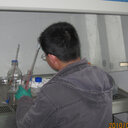Identification of an IKKβ inhibitor for inhibition of inflammation in vivo and in vitro.
Keywords
Abstract
Targeting on the IKKβ to discover anti-inflammatory drugs has been launched for ten years, due to its predominant role in canonical NF-κB signaling. In the current study, we identified a novel IKKβ inhibitor, ellipticine (ELL), an alkaloid isolated from Ochrosia elliptica and Rauvolfia sandwicensis. We found that ELL reduced the secretion and mRNA expression of TNF-α and IL-6 and decreased the protein expression of cyclooxygenase-2 (COX-2) and inducible nitric oxide synthase (iNOS) in bone marrow derived macrophages (BMDMs) stimulated with LPS. In coincided with the results, ELL suppressed PGE2 and NO production in BMDMs. Underlying mechanistic study showed that ELL inhibited IκBα phosphorylation and degradation as well as NF-κB nuclear translocation, which was attributed to suppression of IKKα/β activation. Furthermore, kinase assay and binding assay results indicated that ELL inhibited IKKβ activity via directly binding to IKKβ and in turn resulted in suppression of NF-κB signaling. To identify the binding sites of ELL on IKKβ, IKKβC46A plasmid was prepared and the kinase assay was performed. The results demonstrated that the inhibitory effect of ELL on IKKβ activity was impaired in the mutation, implying that anti-inflammatory effect of ELL was partially attributed to binding on cysteine 46. Furthermore, ELL up-regulated LC3 II expression and reduced p62 expression, suggesting that autophagy induction contributed to the anti-inflammatory effect of ELL as well. In coincided with the in vitro results, ELL increased the survival and antagonized the hypothermia in the mice with LPS-induced septic shock. Consistently, ELL reduced TNF-α and IL-6 production in the serum of the mice treated with LPS. Collectively, our study provides evidence that ELL is an IKKβ inhibitor and has potential to be developed as a lead compound for treatment inflammatory diseases in the future.



